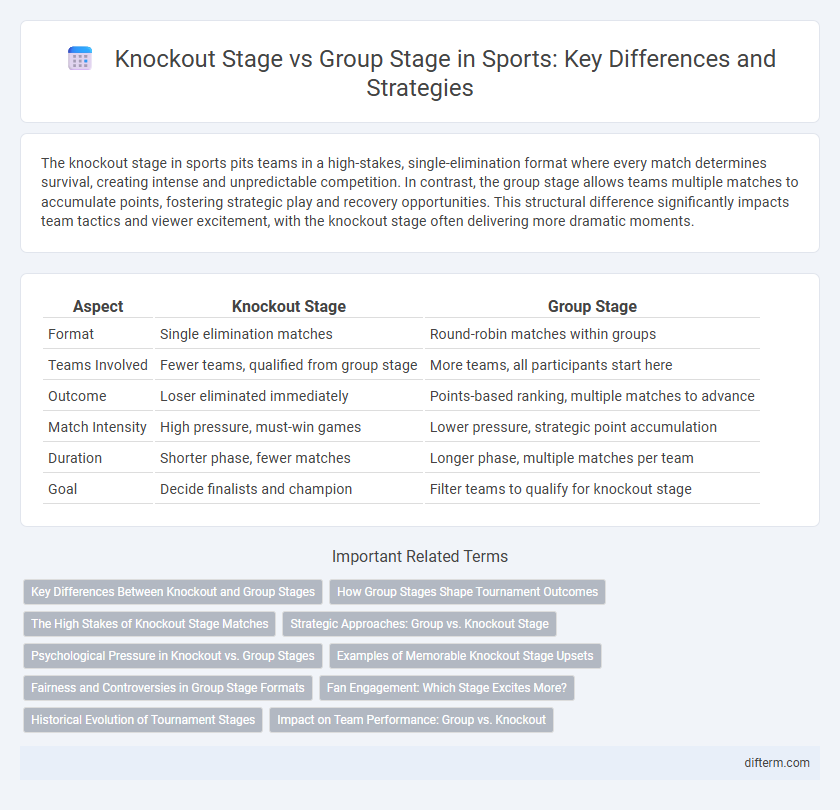The knockout stage in sports pits teams in a high-stakes, single-elimination format where every match determines survival, creating intense and unpredictable competition. In contrast, the group stage allows teams multiple matches to accumulate points, fostering strategic play and recovery opportunities. This structural difference significantly impacts team tactics and viewer excitement, with the knockout stage often delivering more dramatic moments.
Table of Comparison
| Aspect | Knockout Stage | Group Stage |
|---|---|---|
| Format | Single elimination matches | Round-robin matches within groups |
| Teams Involved | Fewer teams, qualified from group stage | More teams, all participants start here |
| Outcome | Loser eliminated immediately | Points-based ranking, multiple matches to advance |
| Match Intensity | High pressure, must-win games | Lower pressure, strategic point accumulation |
| Duration | Shorter phase, fewer matches | Longer phase, multiple matches per team |
| Goal | Decide finalists and champion | Filter teams to qualify for knockout stage |
Key Differences Between Knockout and Group Stages
The knockout stage features direct elimination where teams face immediate exit upon losing, intensifying match pressure and strategy. Group stages involve round-robin play, allowing teams multiple matches to accumulate points and qualify for the next phase, promoting consistency and recovery from early setbacks. Knockout matches often lead to extra time and penalties, unlike group stages where draws are common and point accumulation is crucial.
How Group Stages Shape Tournament Outcomes
Group stages critically influence tournament outcomes by determining which teams advance to the knockout phase, based on points accumulated through wins, draws, or losses. This phase allows teams to build momentum, adjust strategies, and assess opponents, impacting their performance in high-stakes elimination matches. Strong group-stage performance often correlates with higher confidence and tactical refinement, enhancing a team's chances of success in knockout rounds.
The High Stakes of Knockout Stage Matches
Knockout stage matches in sports significantly increase pressure as teams face immediate elimination, intensifying competition and demanding peak performance. Unlike the group stage, where multiple matches allow for recovery from losses, knockout rounds require winning every match to advance, heightening strategic rigor and mental resilience. This high-stakes environment often produces dramatic moments and unforgettable performances that define championships.
Strategic Approaches: Group vs. Knockout Stage
Strategic approaches in the group stage emphasize point accumulation and goal difference to secure advancement, often encouraging balanced offensive and defensive tactics. In contrast, the knockout stage demands high-risk, decisive strategies where teams prioritize winning each match outright, sometimes favoring aggressive attacks or cautious defense to avoid elimination. Coaches tailor formations and substitutions dynamically in the knockout phase to adapt to specific opponents and match situations, leveraging psychological resilience and situational awareness.
Psychological Pressure in Knockout vs. Group Stages
Psychological pressure intensifies significantly during knockout stages compared to group stages due to the single-elimination format, where a single loss results in immediate elimination. Athletes experience heightened stress and anxiety knowing that their performance directly determines advancement or exit, contrasting with group stages that allow recovery from a poor result. This increased mental strain often impacts decision-making, focus, and overall performance under pressure in knockout rounds.
Examples of Memorable Knockout Stage Upsets
The 2018 FIFA World Cup witnessed stunning knockout stage upsets, including Germany's shocking early exit after losing to South Korea. In the UEFA Champions League, Leicester City's unexpected quarterfinal victory over Atletico Madrid demonstrated the high stakes and unpredictable nature of knockout rounds. These moments underscore the intensity and drama distinguishing knockout stages from the more predictable group stage matches.
Fairness and Controversies in Group Stage Formats
Group stage formats in sports tournaments often face criticism for fairness due to unbalanced group strengths and potential manipulation of match outcomes to secure favorable knockout stage positions. Controversies frequently arise from scenarios where teams advance despite weaker performance or where tie-breaking rules create confusion, impacting the integrity of competition. These issues prompt ongoing debates about optimizing group allocations and rule clarity to enhance fairness before the knockout stages commences.
Fan Engagement: Which Stage Excites More?
Fan engagement soars during the knockout stage as each match carries the high stakes of immediate elimination, intensifying emotions and viewer investment. In contrast, the group stage provides fans with multiple games to analyze team strategies and follow their progression, building anticipation and long-term attachment. Data from major tournaments consistently show higher real-time social media interactions and TV ratings during knockout matches compared to the group phase.
Historical Evolution of Tournament Stages
The historical evolution of tournament stages reveals the knockout stage emerged to heighten competition intensity by eliminating teams after single losses, in contrast to the group stage's round-robin format that ensures multiple matches per team. Early tournaments primarily featured direct knockouts, but the introduction of group stages allowed for a more balanced assessment of team performance and reduced early eliminations of strong contenders. Modern sports tournaments often combine group and knockout stages to optimize fairness, maximize viewer engagement, and maintain competitive excitement throughout the event.
Impact on Team Performance: Group vs. Knockout
The group stage allows teams to recover from early losses and adjust strategies through multiple matches, fostering consistent performance development. In the knockout stage, the high-stakes, single-elimination format intensifies pressure, often impacting player psychology and tactics due to the immediate risk of elimination. Teams with depth and experience tend to perform better in knockouts, while group stages favor adaptability and endurance.
knockout stage vs group stage Infographic

 difterm.com
difterm.com